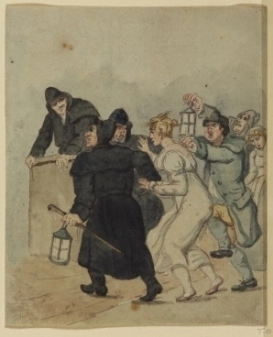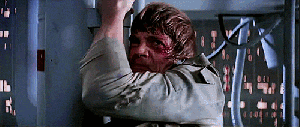
So Modesto Jane Con was this past weekend. From January 10th-12th there were all kinds of workshops, activities, movies, an opera, and even a fashion show!

I, unfortunately, could only go on Saturday, but I had so much fun and I can’t wait until the next one! If there is a next one…

So your $30 ticket allowed you to attend the workshops (BOTH DAYS) and see one showing of Mansfield Park Opera (your choice of Saturday or Sunday).

I dressed up for the event (I’ll post on that later) and brought a reticule my sister made. Reticules are tiny, so I couldn’t pack everything in my bag-just the essentials. Debit card, credit card, ID, fan, gloves, pens, glasses (as I was wearing contacts) and a handkerchief. I wasn’t too worried about the size of the reticule though, as I had planned on purchasing one of their cute tote bags.

I also brought my notebook, as I planned on taking notes and later posting them (as I am now).

Our group was traveling from 1.5-2 hours away (depending on that CA traffic) and left around seven and arrived a little after 8:30. We actually headed to the theater as I was looking at the wrong event. You know me and navigating, I always get lost!
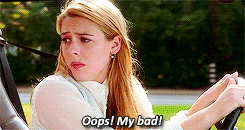
I then redirected our group, and we went to the library. We easily checked in and finished just as they announced the first workshop: Gowns & Groans

So of course, we were excited about this workshop. We wanted to learn more about the Regency gowns and who can resist the chance to snark about costumes?

Let the snark begin!
This workshop was run by Kristine Doiel and Hillari DeSchane
“Costumes have a coded language all their own. They can transport us back to Austen’s time and speak volumes about the characters, or they can be a constant distraction and prevent us from losing ourselves in the unfolding drama. Join veteran costumer Kristine Doiel on a lively, and likely to be controversial, stroll through this Regency costume Hall of Fame and Shame.”
Kristine Doiel is a costume designer and theater educator with over 50 theater and dance productions to her credit. A lecturer at Fresno State since 2017, she has taught costume and theater classes and mentored student designers. Awards include the UC Davis Provost’s Fellowship in Arts, the Princess Grace Foundation Theater Grant and a Dramalogue Award for costume design for The Rivals in Santa Barbara.
Hillari DeSchane is a JASNA life member and a board member of Opera Modesto. Her pre-show opera talks have become audience favorites. DeSchane’s first Regency pet cozy: A Christmas Tail: A Regency Holiday Mystery received a Certificate of Merit from the Cat Writers Association hillarideschane.com

Picture by Arnold Chavez
So Doiel started off the workshop talking about her background; moved onto the judging of the film depictions, finished with her experiences in costuming the Mansfield Park Opera, and concluded with a Q&A.
![]()
Part I: Doiel’s Background
Doiel shared that didn’t have a background in Regency wear, and had to do research on it-being an archeologist, literary analyst, and art historian all in one. I enjoyed this aspect of her talk as you don’t really think about that when watching a film or performance, that not only do the clothes have to be accurate-but they have to reflect the action of the scene, the context of the characters, and the literature of the piece.

That’s a lot
It reminded me of when I studied art history and how you looked at the art and what it was saying, but at the same time also looked into what was happening at the time and how that influenced it. There are many layers you have to work through-such as a self portrait of an artist wearing red, blue, and white takes on a different meaning when it was created post-French revolution, such as to show liberty, fraternity, that is one of the new citizens, etc.

![]()
Part II: Gowns & Groans
The next part of the discussion was Doiel reviewing the clothing choices in Mansfield Park (1999), Mansfield Park (2007), and Pride and Prejudice (1940).
So to start with, I do not like Mainsfield Park (1999).

Not for me..
Eventually I will review it, but as for now-we will get back to the clothes.
Gowns:
Doiel felt that quite a bit of the costumes in here were accurate. Lady Bertram wore flimsy, lacy gowns that looked like something the wealthy class would wear, but older-late 1700s and post-French Revolution. It fits as Lady Bertram wouldn’t be at the height of fashion, but wearing something more her time. Maria, Julia, and the men were all accurate.
Groans:
So here is the good part, let’s start talking trash! J/K, Doiel was very kind in her remarks, trying to not be too judgmental and try to reason why a certain outfit would have been picked.
The first offender: Fanny Price played by Frances O’Conner

So in this Fanny wears a lot of what looks like a jumper or vest over a shirt. This is not accurate at all. Instead the film, which is one reason why I can’t stand it, doesn’t follow the book at all when it comes to Fanny’s character. Instead, they turn Fanny into Jane Austen, and emphasize the writing aspect, dressing her in this more masculine, “writing type” outfit. I call it a “writing type” outfit as when I saw this the first time it made me think of Jo in the 1933 version and she was a writer. It also is similar to what Jo wears in the 2019 version of Little Women.
The other offender: Mary Crawford.

All of Mary’s clothes were too contemporary. I mean look at the dress above, it is something that we were wearing at the start of the millennium, rather than 185 years earlier. I remember wearing sleeves like that on my clothes.
She also has an outfit with a giant collar, that is just what? Doiel pointed out that the person in charge of wardrobe would have the resources and done the research on what was accurate and somebody (whether them, the studio, actor, or the director) picked this for a purpose. Doiel didn’t know why, but guessed that either the director or actor wanted something more modern to relate to audiences.

Mary’s outfits definitely were the worst.
So Mansfield Park (2007) is not the most accurate of films, as they cut a lot out to keep it at standard movie time length-however I am apparently one of the few that actually enjoys it.
Gowns:
She didn’t talk about any she liked as it was time to move onto the next section.
Groans:
The offender here was Billie Piper as Fanny Price.

So Doil noticed that Piper wore a wide range of styles and thought maybe it was so varied as the production wanted her to be wearing hand-me-down gowns. There is a diamond dress that she wears that is completely inaccurate to the time period. Also her hair is one hundred percent wrong, as it is too modern, and she would have had it pinned up as she isn’t a young child. I think that is an interesting comment in light of the Emma Vogue photo shoot.
The other outfit that Doiel pointed out as wrong was the white wedding dress Fanny wears at the end of the film. White wedding dresses only became popular after Queen Victoria, prior to that they were colored dresses. I disagreed with this as I thought the white dress was more a comment on Fanny’s innocence, sweetness, and morality versus being white to be in with what is in fashion today. I mean, after all this takes place after an affair, a love proved false, and all the manipulations by the Crawfords. Plus, it is a foil to Maria’s dress who had opulence (check out that hat) and color, Fanny’s being plain not because of what she was forced to wear (as I am sure Sir Thomas would have bought her a different dress), but a testament to her character. But that’s just my thoughts…
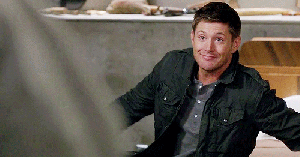
The last one we looked at was Pride and Prejudice (1940) a film I love, but apparently a lot do not.

Gowns:
Nothing was accurate.
Groans:
The film was set in the 1830s instead of the Regency period and no one quite knows why. Some say it was because Gone With the Wind was so popular and they wanted to use costumes like that. Others say it was because the Regency gowns seemed too plain. Others believe it was more cost effective to use these gowns than create new ones. Doiel thought that they might have picked such extravagant costumes as England was having to o with sparse materials, “mend and make do” as the slogan goes, and seeing such fun fabric and opulence would raise spirits. I don’t know if we will ever know…

Hmmm
Doiel said that she felt that this style works for Mrs. Bennet, Kitty, and Lydia as it is extravagant, frivolous, oversized, and fits their characters.
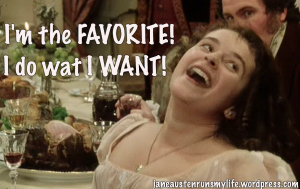

However, with Elizabeth, it works against her.
*Sigh* Laurence Olivier looks great, but he is wearing pants instead of breeches (as are the other men (see below on the view of pants) and Colonel Fitzwilliam wears a kilt (?).

That’s where we ended, although I wished they had discussed Mansfield Park (1983) as that one has some doozies in choices. I mean look at their hair.

From left to right: Edmund Bertram, Mary Crawford, and Mr. Yates
![]()
Part III: Costuming Mansfield Park, the Opera
So Doiel said that when costuming something that takes place in the past, buying the right type of fabric can be a problem. You need something that looks right on stage, fits together as a whole (in color and style), and needs to be accurate as to something they would wear.

Doiel did say that she was fortunate in this Opera to be able to reuse costumes from an earlier production, Miss Bennet: Christmas at Pemberley that had been done in December 2019.
She brought swatches in of the different fabrics for each characters costumes, and me and my group really liked that. We all enjoyed the closeup look and when we watched the performance later in the day, looked at the costumes and remembered what we had seen earlier in the workshop. We also loved that her mom, who helped her sew and cut things out, was there. It was so sweet how she helped hand out the swatches and supported her. I had tried to take a picture of the one for Fanny, but the people in my row wanted me to pass it along and the pic came out blurry.

But Lynne Marcus, one of the organizers from Modesto Jane Con, sent me a pic a friend of hers took.

Doiel’s favorite dress of the production was the gray number that Mary Crawford wears in Scene 5: Chapter Five. In the Wilderness. It was originally worn by Anne de Bourgh in the Miss Bennet: Christmas at Pemberley. I tried to get a good picture, but this was all I got.

She also loved the Navy suit that Edmund wears as she made it.
![]()
Part IV: Q & A
Doiel ended the session by answering questions and talking about Regency wear. Breeches were standard menswear. Pants, or pantaloons as they were called, were not to be worn by the upperclass. They were said to cause a scandal because they showed everything too well-even though in reality breeches showed more. But you know how I feel about that!

This should say breeches instead of pants, but I didn’t write this so it gets a pass. It was an instagram answer from a question I asked my followers.
She said that pants were worn only by the lower class workers, so wearing them was seen as trashy.
Someone asked about the muslin we have today versus then, and she said it is different. The muslin sold in stores today is mostly white and work wear, instead of dress wear. Back in the Regency period it would be block printed, decorated, different colors, and came from India. The muslin was semi-sheer and lightweight, like cotton. Of course whenever I think of Muslin I think of:

India greatly influenced what people wore-in colors, patterns, and of course ladies adopting the use of a pashmina. I had noticed that when I was trying to find something to wear to Jane Con.

From Emma (1996)
Women and men always wore gloves when going out of the house. Doiel mentioned how they weren’t doing that in the Opera as it was too difficult with all the clothing changes. That means that that hand clench scene in the 2005 Pride and Prejudice never should have happened as both Darcy and Elizabeth should have been wearing gloves.

One woman asked about lace, and lace was very in fashion. It came from India or France (probably not as much from France at this time as England and France had been fighting) and was used on hemlines and sleeves.
![]()
My book club + sister really enjoyed this discussion. We wished that Doiel had judged the costumes a bit more, (as who doesn’t like a good rip ?), but understood that she was trying to be fair.
We loved that she stayed on topic-discussing only the clothes instead of the actual films. We would have liked to hear her thoughts on more films or more on costuming the show, but understood we only had an hour and had to be a bit limited to have enough time to cover everything.

DeSchane did a great job moderating the workshop, with her interesting questions and keeping an eye on how much time we had.
We loved it and learned a lot. In fact, later we watched the 1983 Mansfield Park and discussed what we learned in this when we looked at the costumes.

This workshop.
![]()
For more on Regency clothes, go to Muslin: The Fabric of Jane’s Life
For more Mansfield Park, go to Rational Creatures: Fanny Price & Mary Crawford
For more on Jane Austen, go to Praying With Jane: 31 Days Through the Prayers of Jane Austen









